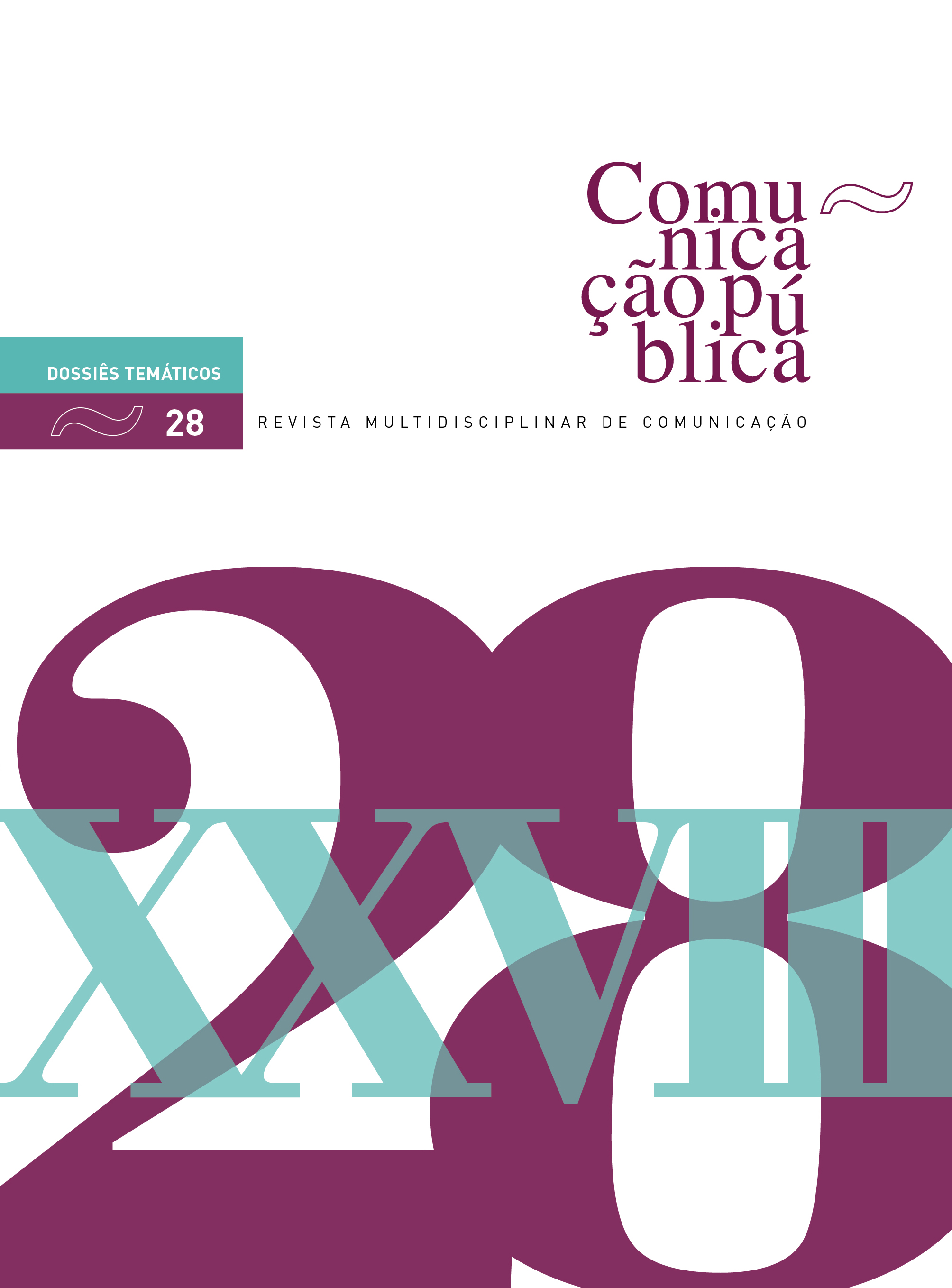A generational portrait of online news consumption in Portugal
contributions to the debate on digital literacies
DOI:
https://doi.org/10.4000/cp.6808Keywords:
online consumption of news, digital literacies, digital divide, generational portraitAbstract
According to data from the latest Reuters Digital News Report Portugal 2019 (n = 2010), we produced a generational portrayal of online news consumption in Portugal that allows us to investigate possible (dis)continuities of the theoretical framework that shapes the discussions on digital literacy and its sub-levels of analysis, namely with regard to the discussion of digital divisions between generational groups.
The conclusion was that in the context of online news consumption in Portugal, young people constitute the generational group that is positioned farthest from the traditionalist profile, while the elderly are still far from being able to integrate the digitalist profile, although data analysis suggests a blurring of the historical differences attributed by the static discourse on digital literacies and digital divide between generational groups regarding the appropriation and use of digital technologies for different purposes.
Downloads
References
Amaral, I. (2020). Senior citizens and the internet. In D.L. Merskin (Ed.), The SAGE international encyclopedia of mass media and society. Thousand Oaks: SAGE.
Anderson, M., & Perrin, A. (2017, 17 maio). Tech adoption climbs among older adults. Pew Research Center. Disponível em: https://www.pewresearch.org/internet/2017/05/17/technology-use-among-seniors/
Ashley, S. (2019). News literacy. In T.P. Vos & F. Hanusch (Eds.), The international encyclopedia in journalism studies (pp.1-7). Hoboken: Wiley-Blackwell.
Aufderheide, P., & Firestone, C.M. (1993). Media Literacy. A Report of the National Leadership Conference on Media Literacy. Aspen: Aspen Institute.
Bennett, S., Maton, K., & Kervin, L. (2008). The “digital natives” debate. British Journal of Educational Technology, 39(5), 775-786.
Brites, M. J., Amaral, I., & Catarino, F. (2018). A era das “fake news”: O digital storytelling como promotor do pensamento crítico. Journal of Digital Media & Interaction, 1(1), 85-98. https://doi.org/10.34624/jdmi.v1i1.928
Buckingham, D. (2019). What price´ news literacy? [Blog post]. Disponível em: https://davidbuckingham.net/2019/03/21/what-price-news-literacy/
Cardoso, G., Paisana, M., Quintanilha, T. L., & Pais, P. C. (2018). Literacias na Sociedade dos Ecrãs. Observatório da Comunicação. Disponível em: https://obercom.pt/wp-content/uploads/2018/03/OberCom2018-Literacias-na-Sociedade-dos-Ecra%CC%83s.pdf
Celot, P. (2012). EAVI studies on media literacy in Europe. Media Studies, 3(6), 76-82.
Fields, J. (2019, 5 maio). We are leaving older adults out of the digital world. Techcrunch. Disponível em: https://techcrunch.com/2019/05/05/we-are-leaving-older-adults-out-of-the-digital-world/
Hague, C., & Payton, S. (2010). Digital literacy across the curriculum. Bristol: Futurelab. Disponível em: https://www.nfer.ac.uk/publications/futl06/futl06.pdf
Hargittai, E., & Hinnant, A. (2008). Digital inequality: Differences in young adults' use of the internet. Communication Research, 35(5), 602-621. https://doi.org/10.1177/0093650208321782
Hargittai, E. (2009). An update on survey measures of web-oriented digital literacy. Social Science Computer Review, 27(1), 130-137. https://doi.org/10.1177/0894439308318213
Hargittai, E., & Hsieh, Y. P. (2012). Succinct survey measures of web-use skills. Social Science Computer Review, 30(1), 95-107. https://doi.org/10.1177/0894439310397146
Harrison, J. (2006). News. London: Routledge. DOI : 10.4324/9780203625538
Helsper, E. (2017). The social relativity of digital exclusion. Communication Theory, 27(3), 223-242. https://doi.org/10.1111/comt.12110
Kajimoto, M., & Fleming, J. (2019). News literacy. In J.F. Nussbaum (Ed.), Oxford research encyclopedia of communication. Oxford: Oxford University Press. DOI : 10.1093/acrefore/9780190228613.013.848
Livingstone, S. (2008) Engaging with media: A matter of literacy? Communication, Culture & Critique, 1(1), 51-62. https://doi.org/10.1111/j.1753-9137.2007.00006.x
Livingstone, S. (2010) Digital learning and participation among youth: Critical reflections on future research priorities. International Journal of Learning and Media, 2(2-3), 1-13. doi:10.1162/IJLM_a_00046
Livingstone, S. (2011). Digital literacy and safety skills. London: LSE Research online.
Morsello, B. (2016). Digitalization of life: How technology redefine the self in the global context. EASST Review, 35(4). Disponível em: https://easst.net/article/digitalization-of-life-how-technology-redefine-the-self-in-the-global-context/
Morduchowicz, R. (2019). Towards a new literacy concept. In J.C. Mateus, P. Andrada & M.T. Quiroz (Eds.), Media education in Latin America (pp. 200-210). London: Routledge.
O'Neill, D., & Harcup, T. (2009). News values and selectivity. In K. Wahl-Jorgensen & T. Hanitzsch (Eds.), The handbook of journalism studies (pp. 161-174). London: Routledge.
Paisana, M., & Cardoso, G. (2013). A literacia como cultura dos média. In G. Cardoso (Ed.), A sociedade dos ecrãs (pp.39-65). Lisboa: Tinta da China.
Palmer, J. (2000). Spinning into control: News values and source strategies. London: Leicester University Press.
Paul, G., & Stegbauer, C. (2005). Is the digital divide between young and elderly people increasing? First Monday, 10(10). Disponível em: https://journals.uic.edu/ojs/index.php/fm/article/view/1286/1206
Pinto, M., Pereira, S., Pereira, L., & Ferreira, T.D. (2011). Educação para os media em Portugal: Experiências, actores e contextos. Lisboa: Entidade Reguladora para a Comunicação Social.
Obercom (2016). Reuters Digital News Report Portugal. Lisboa: Observatório da Comunicação. Disponível em: https://obercom.pt/wp-content/uploads/2016/09/2016_OBERCOM_Reuters_Digital_News_Report.pdf
Obercom (2017). Reuters Digital News Report Portugal. Lisboa: Observatório da Comunicação. Disponível em: https://obercom.pt/wp-content/uploads/2017/12/2017-Reuters-Institute-DNR-PT.pdf
Obercom (2018). Reuters Digital News Report Portugal. Lisboa: Observatório da Comunicação. Disponível em: https://obercom.pt/wp-content/uploads/2018/09/DNR_PT_2018.pdf
Obercom (2018). Reuters Digital News Report Portugal. Lisboa: Observatório da Comunicação. Disponível em: https://obercom.pt/wp-content/uploads/2019/12/RDNRP-WEB-SETEMBRO.pdf
Richardson, J. (2005). News values. In B. Franklin, M. Hamer, M. Hanna, M. Kinsey, & J. Richardson (Eds.), Key concepts in journalism studies, (pp.173-174). London: Sage.
Silverstone, R. (2004). Regulation, media literacy and media civics. Media, Culture & Society, 26(3), 440-449. https://doi.org/10.1177/0163443704042557
van Deursen, A.J.A.M., & van Dijk, J.A.G.M. (2015). Internet skill levels increase, but gaps widen. Information, Communication & Society, 18(7), 782-797. https://doi.org/10.1080/1369118X.2014.994544
Van Dijk, J.A.G.M. (2019). The digital divide. Cambridge: Polity.
William, R., & Edge, D. (1996). The social shaping of technology. Research Policy, 25(6), 865-899. https://doi.org/10.1016/0048-7333(96)00885-2
Wu, Y.H, Damnée, S., Kerhervé, H., Ware, C., & Rigaud, A.S. (2015). Clinical Interventions in Aging, 10, 193-201. https://doi.org/10.2147/CIA.S72399
Yang, Y. (2010). Aging, cohorts, and methods. In R. H. Binstock & L. K. George. (Eds.), Handbook of aging and the social sciences (pp. 17-30). Burlington: Elsevier. DOI : 10.1016/B978-0-12-380880-6.00002-2
Downloads
Published
Issue
Section
License
Copyright (c) 2020 Direitos do Autor (c) 2020

This work is licensed under a Creative Commons Attribution-NonCommercial 4.0 International License.
Os conteúdos da Comunicação Pública estão licenciados com uma licença Creative Commons - Atribuição-NãoComercial 4.0 Internacional.


